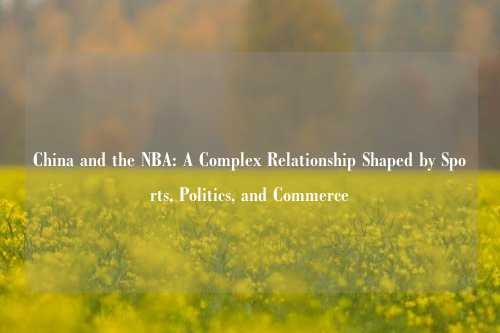The relationship between China and the National Basketball Association (NBA) has long been a fascinating intersection of sports, politics, and global commerce. Over the years, the NBA has cultivated a massive fanbase in China, while China has become one of the league’s most important international markets. However, this relationship has also faced significant challenges, particularly when geopolitical tensions spill onto the court.
The NBA’s Popularity in China
Basketball is one of the most popular sports in China, thanks in part to the NBA’s strategic efforts to expand its reach. The league’s stars, from Michael Jordan in the 1990s to Yao Ming in the 2000s and now players like LeBron James and Stephen Curry, have become household names. The NBA’s games are broadcast to millions of Chinese fans, and preseason games held in China have drawn enormous crowds.

Yao Ming’s success with the Houston Rockets was a turning point, making the NBA more accessible and relatable to Chinese audiences. His career helped solidify the league’s presence in China, leading to lucrative sponsorship deals and partnerships with Chinese companies.
Political Tensions and Controversies
Despite the NBA’s popularity, political issues have occasionally strained its relationship with China. In 2019, a tweet from then-Houston Rockets general manager Daryl Morey supporting Hong Kong protesters triggered a fierce backlash from the Chinese government and fans. The NBA’s subsequent attempts to balance free speech with commercial interests led to criticism from both sides.
Chinese state media and sponsors temporarily cut ties with the NBA, and broadcasts of games were suspended. The incident highlighted the delicate balance the NBA must maintain between its values and its economic reliance on the Chinese market.
Commerce and the Future
Despite controversies, the financial incentives for the NBA in China remain strong. The league continues to engage with Chinese fans through digital platforms, merchandise sales, and youth development programs. Meanwhile, Chinese companies like Tencent and Alibaba have invested heavily in NBA partnerships, ensuring that the relationship remains economically vital.
Looking ahead, the NBA’s future in China will likely depend on its ability to navigate political sensitivities while maintaining its appeal to Chinese fans. As basketball’s popularity grows globally, the league’s ability to balance sports, politics, and commerce will be crucial in one of its most important markets.
In the end, the NBA-China relationship is a microcosm of broader U.S.-China dynamics—a mix of mutual benefit, cultural exchange, and occasional friction. Whether on the court or in the boardroom, the interplay between these two giants will continue to shape the future of basketball and international sports.
This article explores the multifaceted ties between China and the NBA, touching on cultural influence, political challenges, and economic opportunities. Let me know if you'd like any adjustments!















